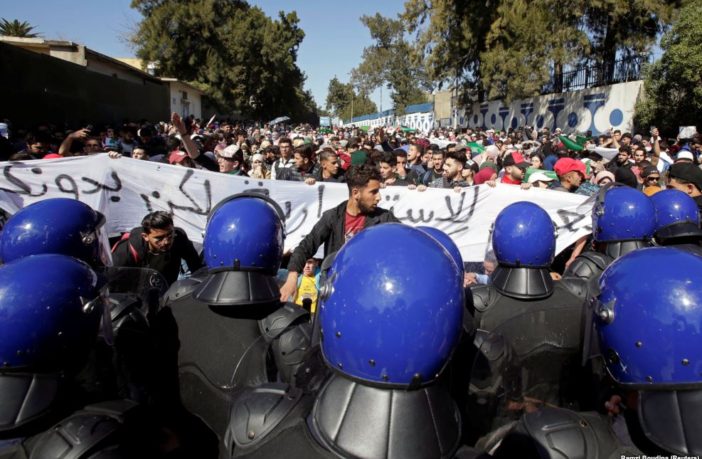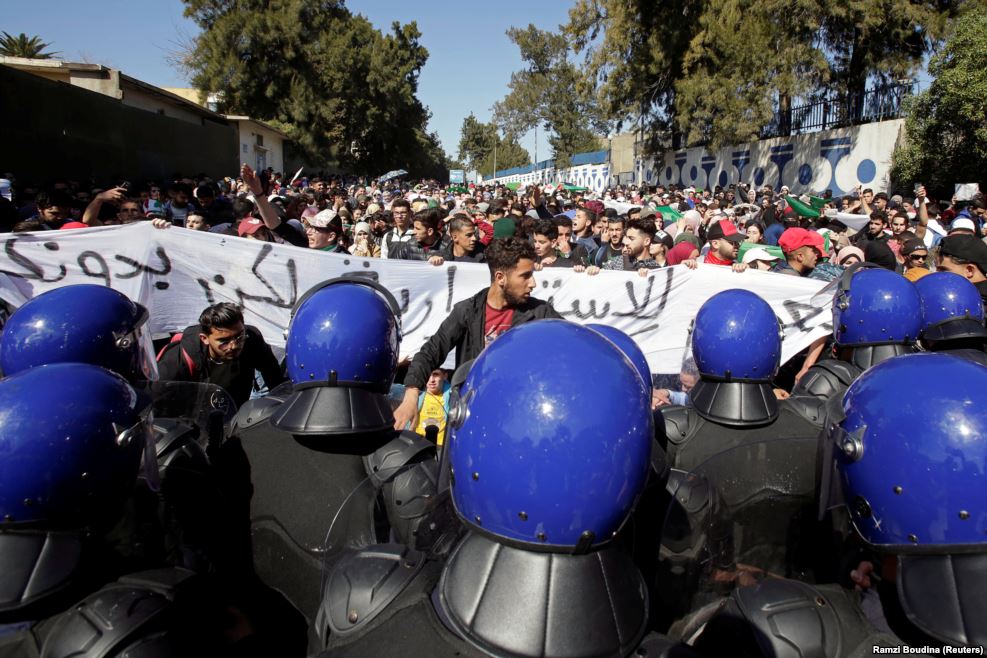Reuters
By Lamine Chikhi
The biggest demonstrations in Algeria since the 2011 Arab Spring uprising have died down since the weekend, but cracks are appearing within a ruling elite long regarded as invincible.
Ailing President Abdelaziz Bouteflika’s offer on Sunday to limit his term after April’s election took some of the steam out of the protests which began late last month, although students and other young people are still on the streets.
“Our duty in this country is to listen, to listen and to imbibe great wisdom to accompany this important social movement for the future of our country,” Sidi Ahmed Ferroukhi, a former minister, wrote on his Facebook account as he announced his resignation from the FLN and parliament.
The FCE, a top business association whose leaders have been long-time supporters of Bouteflika, has also seen resignations in sympathy with the protesters, including of its vice president Laid Benamor.
He said the association had moved away from its mission of helping to lead the country to a brighter future. “Meeting this challenge requires the support of the people too,” he said. “To run counter to the will of our fellow citizens is ineptitude. A nonsense. It’s the negation of our values and our history.”
An anonymous call for a general strike has gone largely unheeded but the leadership faces another test – an online call for a “march of 20 million” – this coming Friday.
The so-far been peaceful protests are unlikely to quickly unseat the embattled president, one of the veterans of the 1954-1962 independence war against France who still dominate Algeria, a major oil producer.
But steady departures from his inner circle as protests rage could make his position untenable, raising concerns among army generals who have dark memories of the civil war which raged in the 1990s after Islamists took up arms when the military cancelled elections they were poised to win.
“NOT THE MILITARY’S BUSINESS”
“It (the army) will not interfere for now because it is up to the civilian ruling elite to clean the mess. This is not the military’s business,” said a retired general, speaking on condition of anonymity due to sensitivities.
“But it will not accept a remake of the 1990s scenario.”
Algeria’s army will guarantee security and not allow a return to an era of bloodshed, its chief of staff said on Tuesday. Gaed Salah referred to the war, saying there were some parties he did not name which wanted Algeria to return to the “years of pain”.
Bouteflika and his closest allies fired dozens of generals last year to remove any possible opponents from the military and previously took similar measures within the security services.
Protesters have praised the military, which has stayed in barracks throughout the unrest.
A former minister expressed doubt that Algeria’s entire political establishment would be dismantled, even if Bouteflika, is pushed out of office.
“Bouteflika’s men will leave, no doubt, but the political system based on consensus among the ruling elite will stay no doubt,” he said. “I can’t see an alternative to the system which will be updated as usual to adapt to the changes and demands of demonstrators.”
For years, rumours have swirled about potential successors for Bouteflika, but no one credible has emerged who has the backing of the army and elite and is not in their 70s or 80s.
The 82-year leader, in office since 1999, said on Sunday he would run in the April 18 poll but call early elections to find a successor after holding a national conference to discuss reforms and a new constitution.
That message was sent by letter, highlighting the disconnect between the president and young Algerians, who express their frustrations on social media.
Bouteflika has not spoken in public since suffering a stroke in 2013. He remains at a hospital in Geneva for medical checks.
Political sources say he is believed to be accompanied by family members including his younger brother Said, a former teacher and unionist who is his advisor: many Algerians believe he is actually running the country.
“I am sure that the president is no longer ruling. So we cannot accept this situation,” said one protestor.
Bouteflika managed to stay in power during the 2011 protests that toppled other Arab leaders because Algeria had plenty of foreign reserves to boost state spending and appease citizens.
Older Algerians still haunted by the civil war have tolerated crackdowns on dissent in exchange for stability.
But young protesters have no real connection to the war of independence that gives Algeria’s elderly leaders their credentials and, desperate for jobs, have lost patience.
European countries which value the north African country as a gas supplier and security partner in a volatile region have largely stayed silent. An exception is the former colonial power, France, which has called for the vote to be held in best possible conditions.
France has major business interests and is home to a large Algerian community.
“Abdelaziz Bouteflika: Too little, too late,” French newspaper Le Monde commented in an editorial.
A joke circulating in Algiers this week summed up the frustrations with the absent leader after one of his aides presented his candidacy for the election in his place and a report said he had sacked his campaign manager.
“So we have one Bouteflika in hospital in Geneva,” it went, “a second Bouteflika who sacked his campaign manager and a third who submits his candidacy.”
Writing by Ulf Laessing








